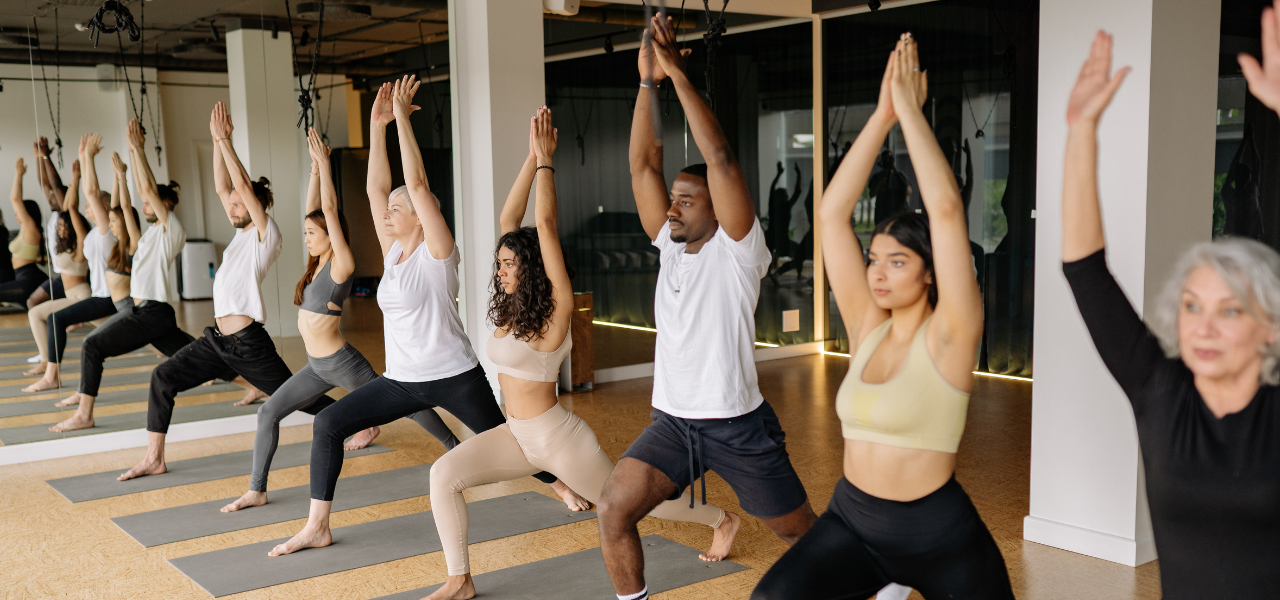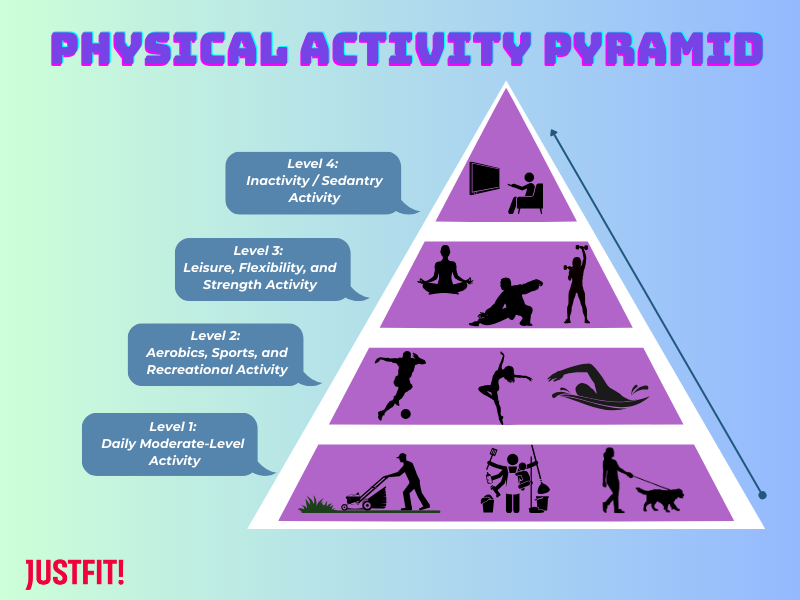


We all hope to achieve good health and fitness to live a quality lifestyle, but not everyone is equally motivated, and they’re sometimes confused about where to start. To simplify things, we introduce the physical activity pyramid. It acts as an easy guide to help you figure out how to keep yourself active in your everyday life. How does this work? Read more to find out about these workout tips!
What is the Physical Activity Pyramid?

The idea behind the physical activity pyramid is pretty simple. It acts similarly to the food pyramid. It helps users figure out and plan their daily lives by providing recommended levels of different types and intensities of physical activities [1].
Just like a food pyramid, the exercises at the bottom are the most rewarding ones, and the activities at the top hold the least importance. This is particularly helpful for those who aren’t sure how to begin their fitness journey or those who lack discipline and need some structure to push them. This strategy can support a variety of health and fitness goals for an active life and is best paired with a balanced diet.
What is the FIIT Principle?
Each level of the physical activity pyramid is curated according to the FIIT principle. This is what the acronym stands for:
- F is for frequency, for how many times a week it is recommended for you to do the activity.
- I is for intensity, for how hard you should be pushing yourself to do the exercise, measuring physical activity intensity. An example of this is your running pace.
- T stands for time, and as evident, it is how long you take to finish an activity. This can also be measured through how many reps you do.
- T here again, and the final letter is for the type of physical activity that the level is prescribing.
Workout tips for physical activities:
Should You Workout When Sore? Everything You Need To Know About It
Is It Better to Do Cardio Before or After Weights? Learn About Expert Opinions
The Physical Activity Pyramid Levels
The image and the following descriptions of each tier will help you better understand how you can incorporate the physical activity pyramid in your everyday life to help you!

Level 1: Daily Moderate-Level Activity
The activities at the lowermost base of the pyramid are ones that we do on a day-to-day basis, and it’s recommended that we continue doing them daily for around 30-60 minutes. Moderate physical activity include brisk walking, mowing the lawn, walking the dog, household chores, playing casual frisbee, etc., and many more that can give you a light activity boost.
Level 2: Aerobics, Sports, and Recreational Activity
The second tier includes enjoyable physical activities that are recommended to be practiced three to five times a week for at least 20 minutes a day. These vigorous activities are meant to help you increase your heart rate and maintain your metabolic health. Examples of aerobic activities and cardio would include biking, swimming, running, jumping rope, etc. For recreation and sports, enjoy playing soccer, badminton, or even dancing.
Level 3: Leisure, Flexibility, and Strength Activity
Level 3 is set for activities that relax you but also help you maintain your fitness. These include exercises that help with flexibility and strength training, along with leisurely activities. They can include anything from weight training and muscle fitness exercises that are recommended to be done at least two to three times a week to gardening, tai chi, or yoga. All the major muscle groups must be warmed up and activated.
Level 4: Inactivity / Sedantry Activity
This is the tier of activity you should be spending the least amount of time on, as these activities can cause adverse health outcomes. Sitting around for long periods of time, watching television, playing video games, and more that require you to be stationary for too long must be avoided. The physical activity pyramid is to encourage you to shift the time spent doing this to some other activity from the other pyramid tiers.
Exercises to explore:
The 12-3-30 Workout: Is It the New Game Changer for Cardio?
Health Benefits of Regular Physical Activity

There are numerous benefits one could bear from indulging in regular physical activity and here are a few of them according to the World Health Organization [2]:
Physical activity plays a key role in preventing and managing noncommunicable diseases in adults, including cardiovascular conditions, cancer, and diabetes. It also alleviates symptoms of depression and anxiety, boosts brain function, and enhances overall well-being. It is essential for children and adolescents because it promotes bone health, supports healthy muscle growth and development, and enhances motor and cognitive skills.
However, 31% of adults and 80% of adolescents fail to meet the recommended physical activity guidelines. To address this, the global goal is to reduce physical inactivity by 10% among adults and adolescents by 2025, and by 15% by 2030, compared to levels in 2010.
Conclusion
We hope that this article has opened your eyes to how helpful a physical activity pyramid can be to help you restructure your fitness life and benefit overall health. For more helpful tips to guide you in your wellness journey, check out the JustFit app and enjoy the 7-day free trial!





